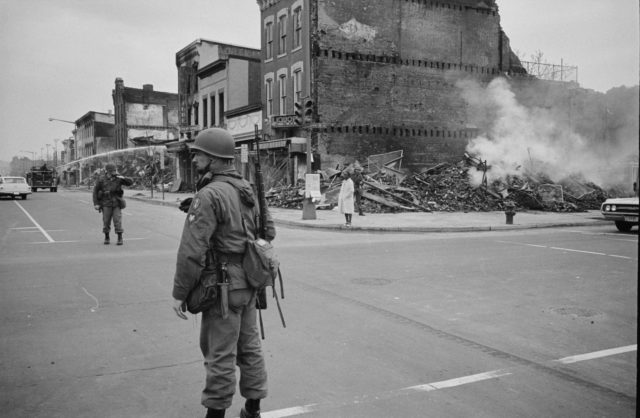
In 1968, the world turned upside down. There was political upheaval on all continents. Rebellions were almost entirely unplanned and unorganized. Popular historian Mark Kurlansky wrote:
“What was unique about 1968 was that people were rebelling over disparate issues and had in common only that desire to rebel, ideas about how to do it, a sense of alienation from the established order, and a profound distaste for authoritarianism in any form. Where there was communism they rebelled against communism, where there was capitalism they turned against that. The rebels rejected most institutions, political leaders and political parties.”
In Paris, a student revolt led to a general strike by almost 10 million workers. Student strikes in Italy forced the prime minister and his cabinet to resign. In Mexico City, peacefully demonstrating students were massacred by government forces. Was it dozens or possibly several hundred?
In the communist country of Czechoslovakia, a palace revolt produced a reformist government promising “socialism with a human face.” Suddenly, there was freedom of the press. Previously taboo subjects were publicly discussed. Former political prisoners confronted their torturers in the media.
In Poland, students and young workers were inspired and demanded change. They were brutally suppressed. In August, the Soviet Union invaded Czechoslovakia to crush the Prague Spring. A resistance arose and persisted for quite awhile. While Soviet tanks rolled into Prague, anti-war protesters were beaten on the streets of Chicago during the Democratic National Convention. Protesters renamed the city “Czechago.”
That year, America seemed to come apart at the seams: A horrific escalating war in Vietnam; huge anti-war demonstrations; the assassinations of Martin Luther King and Robert Kennedy; riots in countless cities. History seemed to be speeding up but toward what destination? Revolution or fascism? Those extreme options seemed plausible… at least to us lefties.
In 1968, I wasn’t old enough to vote but supported third-party candidate Dick Gregory for president. He was a black stand-up comedian who had become a civil rights and anti-war activist as well as a perceptive social commentator. He gave a mesmerizing performance at CU’s Macky Auditorium which featured a grimly serious political narrative dramatically interspersed with jokes.
I vicariously identified with the Yippies or the Youth International Party. Historian David Farber notes that they “began as a dope joke, as a half-cocked combination of hippie ethos and New Left activism, only the real joke was that the inventors meant it.” They engaged in street theater and political pranks like throwing dollar bills from a gallery onto the floor of the New York Stock Exchange.
When the anti-war movement started organizing for demonstrations during the Democratic National Convention in Chicago, the Yippies got a lot of attention because of their wild tongue-in-cheek threats. They were going to put LSD in the water supply and send the city on a “trip.” They would paint cars to look like independent taxis that would kidnap delegates and take them to Wisconsin. They would dress up like Viet Cong and walk through the city handing out rice.
The law enforcement response was massive — 12,000 Chicago cops, 5,000 soldiers from the Army and 6,000 National Guardsmen. Some 10,000 anti-war demonstrators came out, many from the Chicago area. This turnout was disappointing to the organizers. Chicago Sun-Times columnist Mike Royko wrote, “Never before had so many feared so much from so few.”
The city refused to grant permits for people to protest legally. What followed was a “police riot,” according to a report by a federal government commission. The report stated that there was “unrestrained and indiscriminate police violence on many occasions, particularly at night. That violence was made all the more shocking by the fact that it was often inflicted upon persons who had broken no law, disobeyed no order, made no threat.”
This violence was broadcast live on national TV. “The whole world is watching,” the demonstrators chanted. But a Gallup poll showed that 56 percent approved of the police behavior while 31 percent did not. In a Harris survey, 66 percent agreed that Mayor Daley was right in the way he used police against the demonstrators, against only 20 percent who disagreed.
Historian Clay Risen says that the riots that shook 125 American cities after Dr. King’s assassination had a big impact. “Law and order” became “the single most important domestic concern in the 1968 presidential race (after April). Polls repeatedly put it at par with, and even above, the Vietnam war.”
Meanwhile, Hubert Humphrey was heckled nearly everywhere by anti-war protestors. Nixon became president in a close election. Since the 1930s, Americans shared a common sense about the world coming out of the New Deal. This was now ending.
1968 had been a year of rebellion across the planet. At the end, the right-wing triumphed. It has been 50 years but the spirit of ’68 still haunts us. Todd Gitlin points out that in 1968, people didn’t sing the songs or debate the politics of 1918 half a century before. He says, “Yet ’68 — and the 1960s in general — have played a part in virtually every presidential election.”
This opinion column does not necessarily reflect the views of Boulder Weekly.














